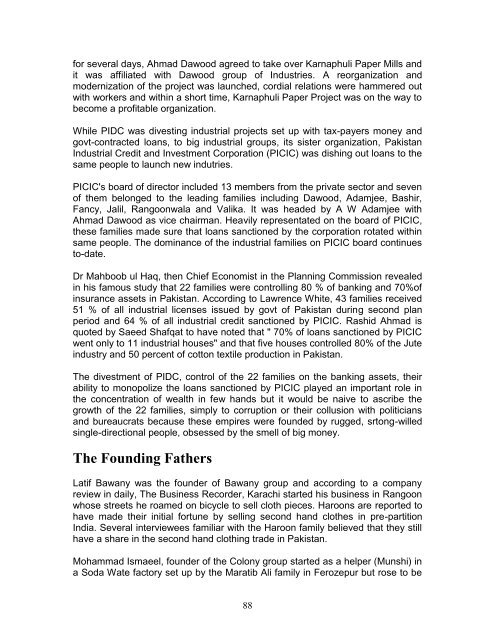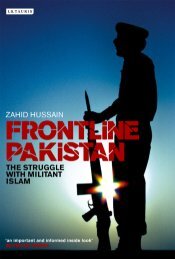Who Owns Pakistan - Yimg
Who Owns Pakistan - Yimg
Who Owns Pakistan - Yimg
Create successful ePaper yourself
Turn your PDF publications into a flip-book with our unique Google optimized e-Paper software.
for several days, Ahmad Dawood agreed to take over Karnaphuli Paper Mills and<br />
it was affiliated with Dawood group of Industries. A reorganization and<br />
modernization of the project was launched, cordial relations were hammered out<br />
with workers and within a short time, Karnaphuli Paper Project was on the way to<br />
become a profitable organization.<br />
While PIDC was divesting industrial projects set up with tax-payers money and<br />
govt-contracted loans, to big industrial groups, its sister organization, <strong>Pakistan</strong><br />
Industrial Credit and Investment Corporation (PICIC) was dishing out loans to the<br />
same people to launch new indutries.<br />
PICIC's board of director included 13 members from the private sector and seven<br />
of them belonged to the leading families including Dawood, Adamjee, Bashir,<br />
Fancy, Jalil, Rangoonwala and Valika. It was headed by A W Adamjee with<br />
Ahmad Dawood as vice chairman. Heavily representated on the board of PICIC,<br />
these families made sure that loans sanctioned by the corporation rotated within<br />
same people. The dominance of the industrial families on PICIC board continues<br />
to-date.<br />
Dr Mahboob ul Haq, then Chief Economist in the Planning Commission revealed<br />
in his famous study that 22 families were controlling 80 % of banking and 70%of<br />
insurance assets in <strong>Pakistan</strong>. According to Lawrence White, 43 families received<br />
51 % of all industrial licenses issued by govt of <strong>Pakistan</strong> during second plan<br />
period and 64 % of all industrial credit sanctioned by PICIC. Rashid Ahmad is<br />
quoted by Saeed Shafqat to have noted that " 70% of loans sanctioned by PICIC<br />
went only to 11 industrial houses" and that five houses controlled 80% of the Jute<br />
industry and 50 percent of cotton textile production in <strong>Pakistan</strong>.<br />
The divestment of PIDC, control of the 22 families on the banking assets, their<br />
ability to monopolize the loans sanctioned by PICIC played an important role in<br />
the concentration of wealth in few hands but it would be naive to ascribe the<br />
growth of the 22 families, simply to corruption or their collusion with politicians<br />
and bureaucrats because these empires were founded by rugged, srtong-willed<br />
single-directional people, obsessed by the smell of big money.<br />
The Founding Fathers<br />
Latif Bawany was the founder of Bawany group and according to a company<br />
review in daily, The Business Recorder, Karachi started his business in Rangoon<br />
whose streets he roamed on bicycle to sell cloth pieces. Haroons are reported to<br />
have made their initial fortune by selling second hand clothes in pre-partition<br />
India. Several interviewees familiar with the Haroon family believed that they still<br />
have a share in the second hand clothing trade in <strong>Pakistan</strong>.<br />
Mohammad Ismaeel, founder of the Colony group started as a helper (Munshi) in<br />
a Soda Wate factory set up by the Maratib Ali family in Ferozepur but rose to be<br />
88













